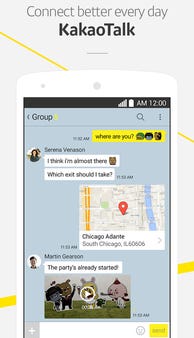In the past few years standard messaging has gone out of style, with billions of people around the word migrating to alternate instant messenger apps.
Facebook rules the roost in western countries, with the two most widely used apps both owned by the social media giant: Facebook Messenger and WhatsApp. Facebook CEO Mark Zuckerberg announced in June that the site’s Messenger app had 700 million active users, up from 600 million just 3 months prior. Meanwhile, WhatsApp, which Facebook purchased for $16 billion last February, recently reported a mind-boggling 900 million monthly active users.
But the thing with messaging apps in the west is that they’re just not that different to one another. WhatsApp essentially offers the same suite of services as its less popular competitors Viber and Kik — the only real motivation to download a certain app is the number of your friends who use it.
It’s not quite the same in China, Japan, South Korea and India. Each country has its own wildly popular messenger apps, each with distinguishing features.
 Enlarge Image
Enlarge Image
China’s WeChat and its social media marketplace
Tencent’s WeChat messenger has over 500 million monthly active users, with about 85 percent of that number in China. It features a solid list of functions, including location sharing and smartwatch compatibility, but the one feature that makes it unique is called weishang.
Weishang, which translates roughly to microbusiness, allows users to sell goods and services to their contact list, advertising them through the app’s Moments status update function. Imagine WhatsApp mixed with Craigslist.
Unsurprisingly, though perhaps a little ironically, the microbusiness platform has attracted the attention of mega businesses.
In July, Chinese home appliance giant Haier experimented by recruiting 30,000 people to sell its products through WeChat. Earlier this month a Haier executive announced that it hopes to have no less than one million vendors on the platform in 2016, according to the South China Morning Post.

 Enlarge Image
Enlarge ImageNimbuzz
India’s Nimbuzz
Nimbuzz, India’s most widely used messenger, is distinguished by a simple feature that’s surprisingly rare in the instant messenger marketplace.
Developed by Dutch-owned, but India-operated Nimbuzz BV, the app allows its users to communicate across messenger apps. Though direct competitors like WhatsApp or Viber aren’t compatible, Nimbuzz users can message their friends across platforms like Facebook Messenger, Google Plus and Windows Live Messenger.
The app is also popular in India thanks to its discounted international voice calling rates. Its userbase was numbered at around 150 million in 2013, but has been growing alongside the developing smartphone market in the country — last year Nimbuzz’s CEO told The Next Web there were 210,000 new signups per day.

 Enlarge Image
Enlarge ImageLine
Japan’s Line messenger’s sticker level is over 9000 (literally)
Line was created by NHN Japan, a subsidiary of South Korean tech company Naver. The app’s creation was necessitated by the 2011 Tohoku earthquake and tsunami, with NHN Japan’s employees developing Line to communicate with each other following the ravaging of the country’s telecommunications infrastructure.
The app was released to the public later that year and now, just four years on, it has been downloaded by over 600 million people.
The hallmark of the messenger app is the ridiculous quantity of its stickers. Line is decked out with over 10,000 emoticon options, for all your emotive needs. For comparison, there are roughly 900 emojis available — though they’re often not all usable on the same device.
To compliment the sea of ideograms and smiley faces, Line features a strong suggestive sticker keyboard. For instance, if you type in “dog” you’ll be hit with three pages of different canine emoticons.
The caveat is that many of the 10,000 stickers need to be downloaded in packs, and some of them need to be paid for. But even then… 10,000!

 Enlarge Image
Enlarge ImageKakao
South Korea’s KakaoTalk
South Koreans like to keep things local. Local companies Samsung and LG are two of the three most popular handset creators in the country, and Kaokao Talk, developed by Seoul-based Kakao Inc, at last count was used by 93 percent of South Korea’s smartphone users.
And there’s good reason too, as the app is one of the world’s most robust messengers. In addition to the standard messaging and voice call capabilities, the app is open source, allowing for users to make creative and unique themes for themselves and others.
Another simple, yet surprisingly rare, function is the ability to create events within the app. Coordinating events with your friends is a huge part of Facebook’s appeal and the reason why many people struggle to extricate themselves from the social network.
Another social media-like feature of KakaoTalk is the ability to buy real-world gifts for your friends. You can buy vouchers for food, services and products at cooperating companies, the list of which has steadily grown with the popularity of the app.
All of these apps are available for download on iOS and Android in all countries — but unfortunately some of the more interesting features, like Weishang and Kakao’s gifting, are only available in the respective app’s native country.




